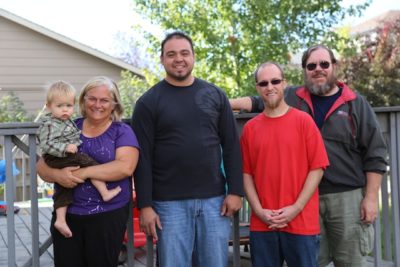
Recently I wrote a post that provided only passing mention of safety considerations for men mentoring boys. I encouraged men to volunteer to provide transportation for fatherless boys who wanted to attend their church’s youth group. I briefly stated that they would need to submit to background checks and any other requirements of their church.
Some of my readers responded that I needed to emphasize that two men should be involved in transporting boys to church, as well as in any mentoring relationships.
This requirement seemed like overkill to me, so I decided to do some research on the subject of men mentoring boys. I wanted to know if men/boy mentoring organizations required two men in their mentor relationships.
I couldn’t find any that do, but I came upon Big Brothers/Big Sisters’ (BBBS) child protection policy and at the same time discovered a law firm (BBBS Child Abuse Attorneys) that specializes in suing BBBS local chapters for child abuse. It also has a recommended child protection policy on their website.
After comparing BBBS’s policy with BBBS Child Abuse Attorneys’ policy, I have concluded that two adult men should be involved at all times in mentoring relationships with boys, and this includes providing transportation to youth groups. I am amending my previous post to reflect this conclusion.
Below are the two policies. You will see that BBBS Child Abuse Attorneys’ policy is much more thorough than BBBS’. Churches and men’s ministries, please take notice.
Big Brothers/Big Sisters – SAFEGUARDING CHILDREN
(You can find the following Big Brothers/Big Sisters’ child protection policy online here.)
How do Local Programs Protect Children While in their Care?
NATIONALLY REQUIRED STANDARDS OF EXCELLENCE
Big Brothers Big Sisters of America (BBBSA) affiliated agencies are separate 501©3 organizations that have the primary responsibility for risk management and youth protection in their organizations. This includes the establishment of local policies and procedures that best protect youth, effective screening and selection of staff and volunteers, and professional monitoring of match relationships.
For decades, BBBSA has worked with local agencies and national violence prevention experts to implement nationwide standards based on industry best practice of high quality in service delivery. On a constant basis, we work with agencies and outside experts to carefully examine our standards and service delivery model as emerging best practices in child safety evolve.
TRAINING IN CHILD PROTECTION
Everyone associated with a Big Brothers Big Sisters program, including professional staff, parents, volunteers, children and board members, is required to be trained in recognizing and responding to suspected child abuse.
PARENTS AS PARTNERS
When it comes to the future of our children and the well-being of our communities, we are all in this together. So it should come as no surprise that we need the parents and guardians of Littles to be involved every step of the way. Parents approve the selection of their child’s Big and remain in close contact with professional staff to look out for their child’s best interests and to help achieve the best possible outcomes for their child. Parents approve all activities and outings between Bigs and Littles and communicate regularly with their child and their Big to help ensure healthy and safe relationship development.
SCREENING & SELECTION OF BIGS
Making the best possible match between a Little and a Big is critical to the growth and development of a child. But before we begin the matching process, agency professional staff start by thoroughly screening potential Bigs.
Big Brothers Big Sisters National Standards of Excellence require each volunteer to complete an extensive screening process that includes:
✓ Completion of a formal written application
✓ Background and reference checks
✓ An in-person interview
✓ An orientation and training process that outlines the individualized needs of the child and provides information and resources on how to encourage each child’s development
PROFESSIONAL MATCH SUPPORT
Our highly qualified, specially trained match support professionals are responsible for helping to ensure that relationships between Littles and Bigs are developing in a healthy, safe way for everyone involved. They’re also responsible for helping guide mentoring relationships that will be enduring and enriching, and result in positive outcomes for youth, unique to Big Brothers Big Sisters.
Our ongoing match support process is extensive, and includes:
✓ Required match supervision by trained staff, including ongoing communication with match participants for the life of a match
✓ Professional monitoring of adherence to safety-related policies and procedures focused on maintaining appropriate boundaries and healthy relationship development
✓ Nationwide technology that tracks and monitors match activities and Littles’ progress in areas such as academics, avoidance of risky behaviors, socio-emotional development, and aspirations
BBBS Child Abuse Attorneys’ Recommended Child Protection Policy
(BBBS Child Abuse Attorneys specializes in suing local Big Brothers Big Sisters for child abuse. You can find their following recommended child protection policy online here.)
HOW TO PREVENT SEXUAL ABUSE IN YOUTH ORGANIZATIONS
Sexual abuse should never be downplayed, ignored, or addressed in-house by an organization. It is a crime and it needs to be treated as such.
SCREEN EMPLOYEES/VOLUNTEERS
For any child-facing positions, background checks (including criminal records and actually calling previous employers to check the reason for leaving) are essential. This should include other teens and minors as many cases of child abuse are perpetrated by other minors. Clean background checks do not preclude the possibility of sexual abuse but it should at least mean that known offenders are not placed in a position where they can cause further harm.
INTRODUCE STRICT CODES OF CONDUCT
Youth-serving organizations must be clear about what constitutes positive interactions between adults and youth and what are harmful ones. Introduce employees to your code of conduct and have them sign off annually. Most incidents of child sexual abuse happen between one adult and a minor, so it’s a good policy to ensure that two adults are always present (no one-on-one interactions), to prohibit meetings outside of the organization’s direct environment, and to impose clear rules about permitted physical contact.
CLOSELY MONITOR STAFF/VOLUNTEER BEHAVIOR
Staff and volunteers must adhere to the strict codes of conduct you introduce and rules must be enforced. This will require some degree of monitoring to check for violations of conduct and to report via a clear chain of command. Youth organizations should protect themselves by documenting the steps taken to monitor their people and to note where guidelines have not been followed and inappropriate behavior has been discovered e.g. meeting out of hours, giving gifts, one-on-one meetings, etc. Unscheduled observations of employees and volunteers as they engage with youth members should be part of any supervisory role.
INVESTIGATE AND DISCIPLINE UNDESIRABLE BEHAVIOR
Human resources must be prepared to look into instances where guidelines have been breached. Law enforcement or child protection services may need to be notified to investigate. Internal investigations may harm the legal process so it’s best to:
- Create a series of policies for investigating reports with the collaboration of a lawyer
- Clearly define inappropriate behaviors
- Define which violations are investigated internally and which involve authorities
- Be clear on the confidentiality and community/press responsibilities
- Introduce policies for how to handle a staff member/volunteer while they are under investigation for sexual abuse
- Nominate a particular person to report instances of child abuse to the authorities
- Document all reports and investigations
CREATE ENVIRONMENTS THAT DETER ABUSE
Youth organizations can introduce changes to their environment that help prevent abuse, such as:
- Installing security cameras in areas that may be hidden from view
- Making sure there are clear lines of sight at all times
- Making lighting brighter
- Locking closets/storerooms
- Having open-door policies
- Fitting windows into all doors
- Ensuring safety in toilets, showers, and changing rooms
PROVIDE ONGOING TRAINING
Ongoing (at least annual) training for employees, volunteers, and youth members about sexual abuse is a key component to preventing it. Include information about:
- Sexual grooming and warning signs of child sexual abuse
- Definitions of appropriate and inappropriate conduct
- Organizational policies regarding child sexual abuse prevention
- How to report instances of abuse

Since 2003 New Commandment Men’s Ministries has helped hundreds of churches throughout North America and around the world recruit teams of men who permanently adopt widows, single moms and fatherless children in their congregations for the purpose of donating two hours of service to them one Saturday morning each month. We accomplish this with a free training site called New Commandment Men’s Ministry Learn how to mobilize your men’s ministry to meet every pressing need in your church at newcommandment.org.
_______________________________________________________________

Learn how to form teams of men for every widow, single mom
and fatherless child in your church at NewCommandment.org.
_______________________________________________________________